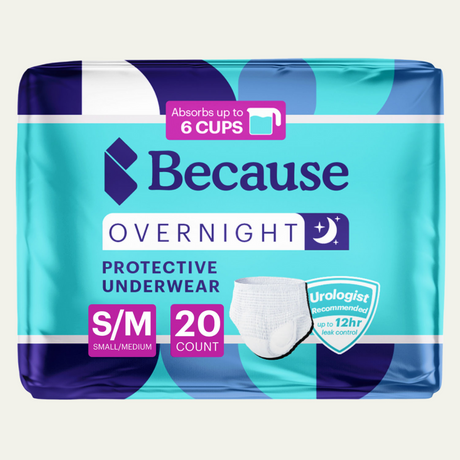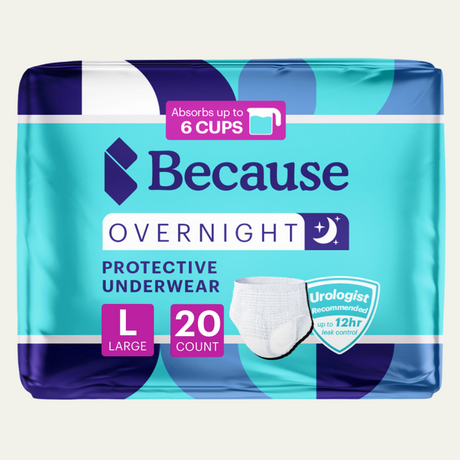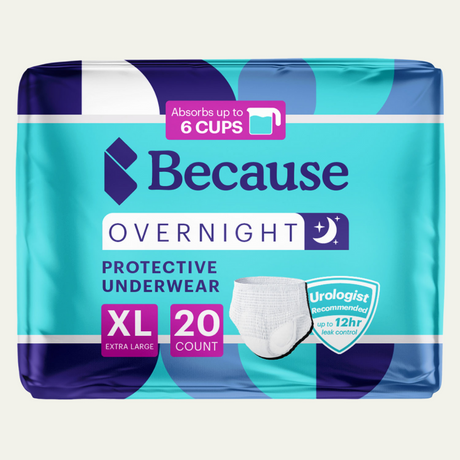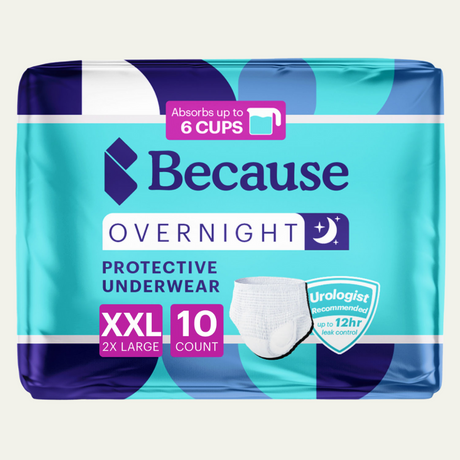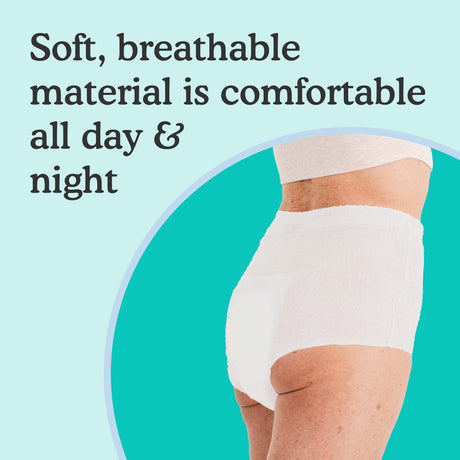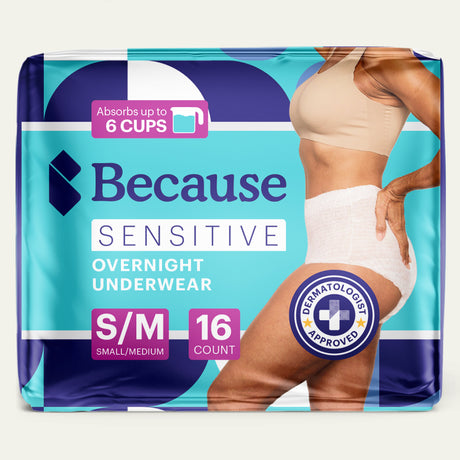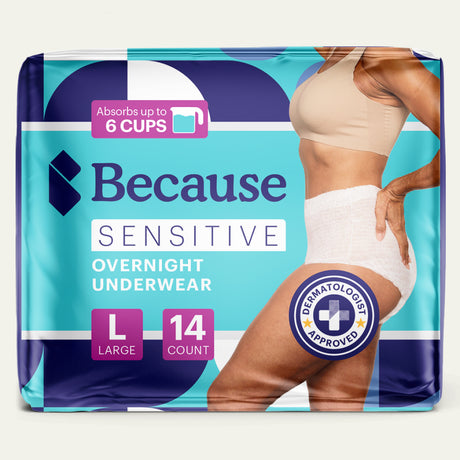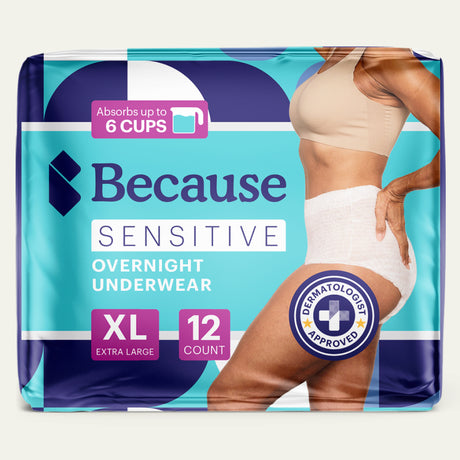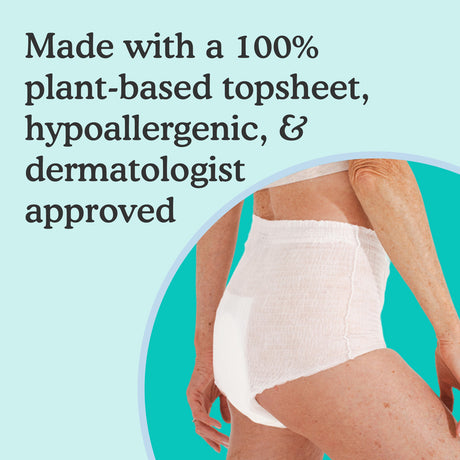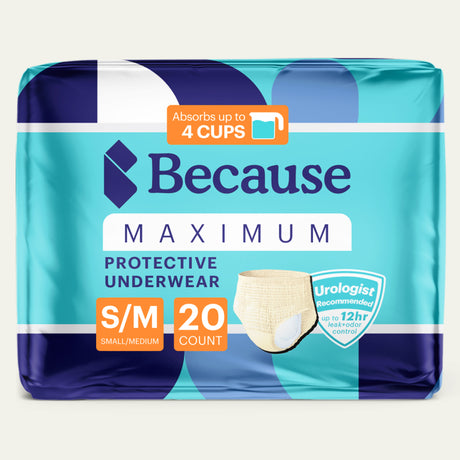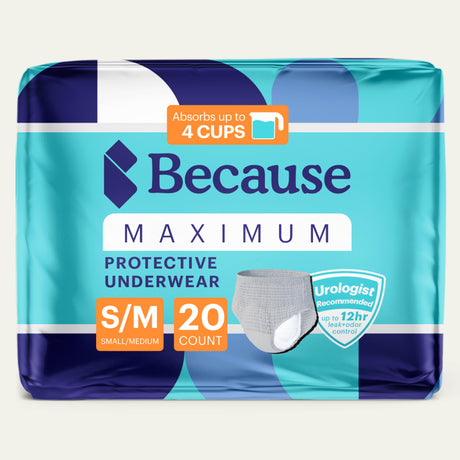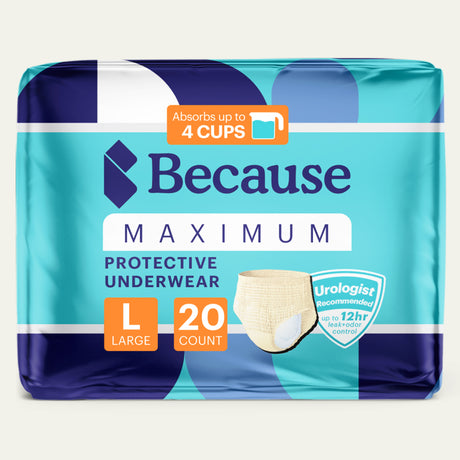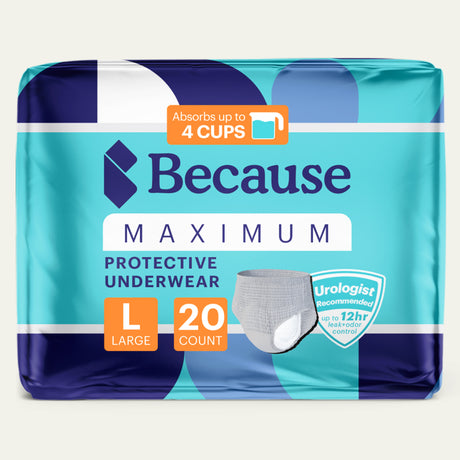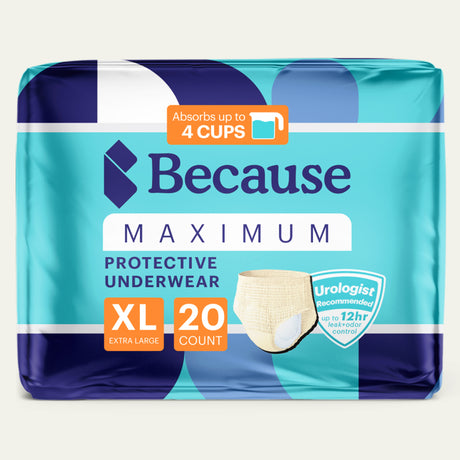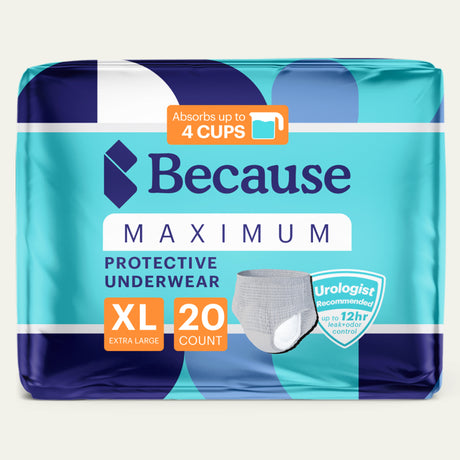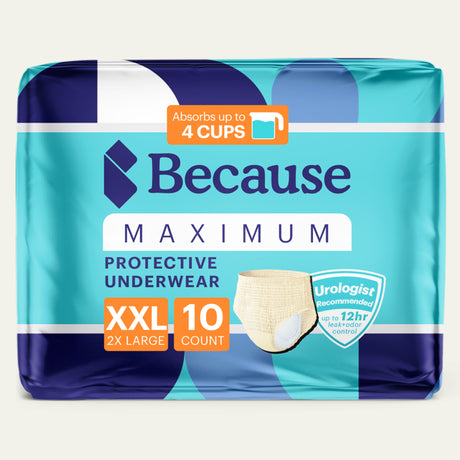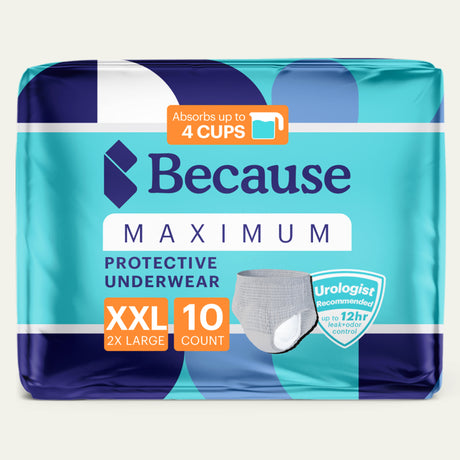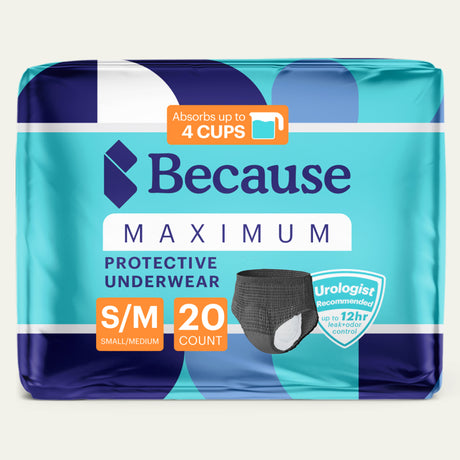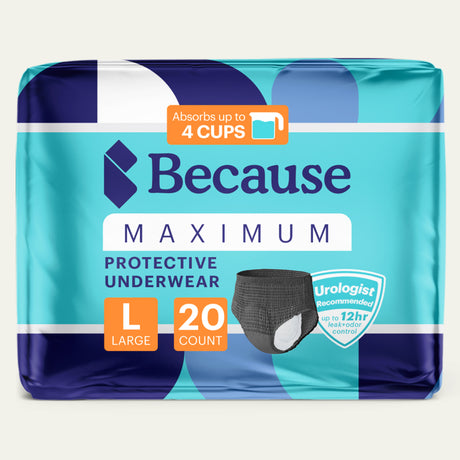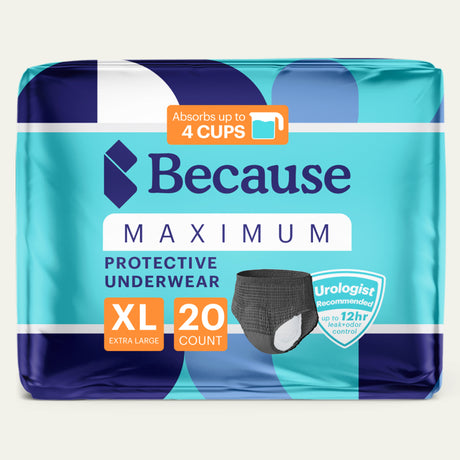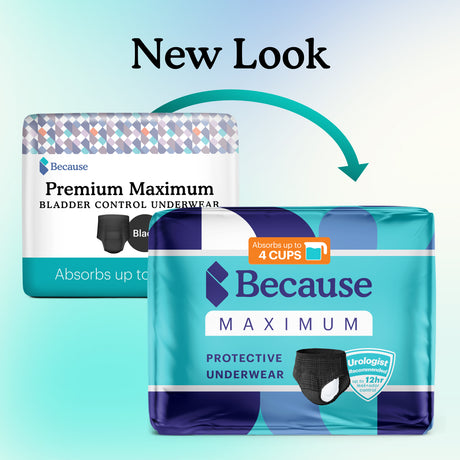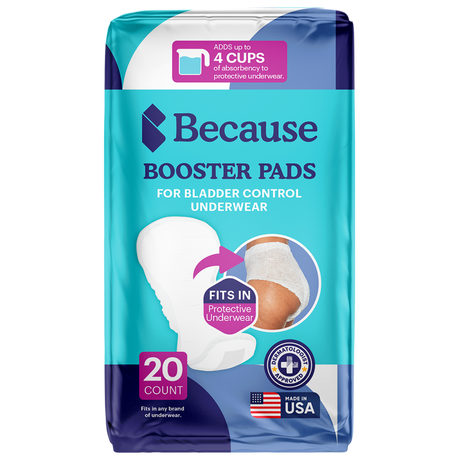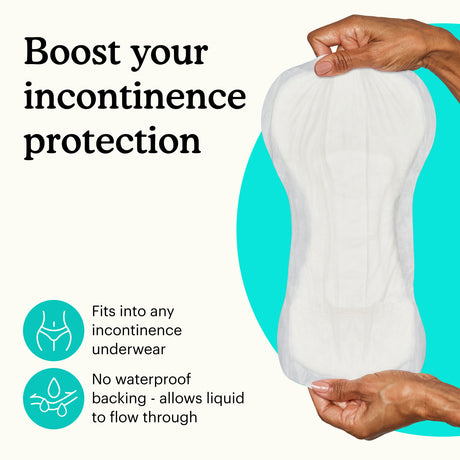Bowel incontinence (also known as fecal incontinence) is more common than you think. Over 5.5 million Americans deal with some form of bowel incontinence due to a number of causes, from trauma (for example, from surgery or childbirth), to stiffening of the rectal wall thanks to Crohn’s and other inflammatory conditions, nerve damage that makes it difficult to control the bowels, and functional incontinence caused by dementia or loss of mobility.
Although bowel incontinence can be disruptive, with the right products and strategies you can take charge of your life rather than letting incontinence take charge for you. Talk to your doctor to find the causes of your bowel incontinence and see if there are treatments, and prepare for accidents by using protective products that will help you live your life with confidence.
What Should I Wear for Bowel Incontinence?
If you are experiencing bowel incontinence, you’ll probably want to consider using absorbent pads or underwear to help manage leaks. Many incontinence products that are advertised for urinary incontinence can also be used for bowel incontinence. What you choose to wear depends on several factors, including the severity and frequency of your bowel leaks, how active you are, and what feels most comfortable for you.
If you only experience very small amounts of leakage, your bowel incontinence might be best managed with underwear liners. If you have more frequent or larger bowel leaks you’ll probably need higher absorption products.
The most reliable products for managing bowel incontinence are adult briefs and absorbent underwear with some form of leak-proof leg openings to help keep waste from spilling onto your clothing. Additional products, like skin cleaners and bed protectors, can help you clean up more easily after accidents occur.
How to Choose Bowel Incontinence Products
Severity and Frequency of Bowel Episodes
How often and how severe your bowel leaks are is a good indicator of what kind of product you need.
Light: If you only have occasional leaks (e.g. not every day) and you only lose a tiny amount of stool when you sneeze or pass gas, you might want to try pads, and change them out whenever you have an episode. Light-absorbency underwear can also serve the same function but also provide peace of mind in case you’re worried about having a bigger leak.
Moderate: If you experience more frequent leaks or larger uncontrolled bowel movements, higher absorbency incontinence underwear is for you. You might also consider buying boosters to put inside your absorbent underwear or adult briefs, and then changing these liners out after smaller incidents.
Severe: If you have bowel leaks multiple times a day, or if you have diarrhea or large uncontrolled bowel movements, you should look for maximum absorbency underwear or adult diapers and be prepared to change them multiple times a day.
Containment
Just like with urinary incontinence, if you have bowel incontinence you should look for underwear that has leak-proof leg openings, so that accidents don’t spill onto your clothes. Because absorbent underwear, for example, has triple-stitched leak guards that hold the leg cuffs in place and stop messes from escaping your underwear. Look for leak-proof designs wherever you shop for incontinence underwear.
The added weight of stool inside your underwear can stretch out the material, making the leak guards less effective, so it’s a good idea to have extra pairs of underwear on hand and change them as soon as you can after an accident.
Absorbency
Absorbency is especially important when dealing with diarrhea or watery stool. By trapping liquids, absorbent underwear can greatly reduce odors and prevent leaks from soiling your clothes.
For minor to moderate incontinence, moderate absorbency underwear should be able to contain accidents until you can get to the bathroom to change. If you have more severe incontinence, choose products with higher absorbency to hold in liquid. You can check our guide to absorbency and size to learn more about what products are best for your situation.
Highly absorbent underwear can capture the liquid that comes along with bowel movements, but these products should still be changed as soon as possible after accidents because the solid stool left behind can cause skin irritation, odors, and can make your underwear less absorbent.
Your underwear’s absorbency will be affected by having solid stool in the underwear, so you should change your underwear (or booster pad, if you’re using the booster pad strategy) as soon as possible after an accident, even if it was a small amount of stool.
Style
If you’re a caregiver working with someone who has limited mobility, briefs or diapers with tab closures might be easier to use because you can put them on while the person is lying down, and use the tabs to get a more precise fit.
For people who are more mobile, pull-on underwear is both comfortable and discreet underneath your clothing, and is popular among regular users of incontinence products. Because Market offers absorbent underwear in a pull-on style that can contain both urinary and fecal incontinence.
Guards and pads are less absorbent, but can be helpful if you’re only dealing with small leaks. They can also be easily changed and you can carry several with you if you’re going out and switch them out after an accident.
Some people prefer reusable absorbent underwear and plastic pants for nighttime, others prefer disposables—whatever you use will depend on what feels comfortable for you.
The Best Bowel Incontinence Products
If you’re newly incontinent or care for someone who has bowel incontinence, here are some helpful products for containing leaks and odors when going about your day or night:
Disposable underwear
The first and most important tool for managing your incontinence is absorbent underwear or adult diapers. Absorbent underwear can be easily worn under clothing and helps stop leaks from soiling your clothes and creating stains or odors. Because Market’s maximum protection underwear can hold up to four cups of liquid, and our overnight underwear can hold six cups (three times as much as the human bladder).
Don’t worry if your first pair doesn’t fit quite right—most brands, including Because, will send you a sample pack, and Because will send you a new sample if you don’t get the right pair on the first try.
Pads and guards
Pads and guards offer good protection if you have mild incontinence. Because Market’s pads come in moderate, maximum, and overnight absorbencies, and their soft top makes them comfortable to wear all day.
Disposable bags
Disposable bags are a must-have if you’re trying to discreetly dispose of soiled incontinence products. The bags from Because Market are lightly scented to cover up odors, solid-colored to hide messes, and they’re biodegradable.
Other Helpful Products for Managing Bowel Incontinence
Skin Care
The enzymes in both urine and stool can damage your skin, so cleaning and protecting your skin after accidents is a priority if you have bowel incontinence. This not only helps avoid infections, but can keep you comfortable and prevent odors. If you’re cleaning up frequently between accidents, or if you’re an older adult who has more sensitive skin, look for products that are non-drying and sensitive-skin friendly.
Use cleansing wipes and sprays to gently clean your skin when you change your underwear after accidents. Because Market’s cleaning wipes are hypoallergenic, extra-large, and contain soothing ingredients like aloe and vitamin E. Our no-rinse cleansing sprays are pH balanced and will sanitize your skin without drying it out.
A moisture-barrier skin cream will provide an extra layer of protection between your skin and urine or stool, which helps to avoid chafing and irritation. Our skin cream is zinc-based and hypoallergenic, and will not rub off onto your pad or underwear (which can reduce the absorbency of the pad).
Bed Protectors
If you’re worried about having accidents at night and soiling your bedding, put a bed protector over your mattress for extra security. Because Market’s bed protectors are absorbent, have a waterproof backing, and can be used anywhere you want an extra layer of protection. Use them under your sheets, on your chair, or even in your car if you’re going for a long drive.
Odor Control
Even with the best protection, leaks can still sometimes occur, so keep odor and stain removing sprays on hand to eliminate odors and keep your home and furniture feeling fresh and clean. We sell environmentally-friendly odor and stain removing spray as well as odor-eliminating air spray to help neutralize any odors that might come along with the occasional accident.
While the right products can help you manage your everyday leaks, remember to talk to your doctor about your bowel incontinence to find out the underlying causes and potential treatments. Medication, surgery, and physical therapy including pelvic floor exercises are some of the treatment options that your doctor might recommend depending on what is causing your incontinence.
Shop bowel incontinence products at Because Market, and take our fit quiz to get an underwear starter pack!
Sources:
Mayo Clinic. (2022, Nov. 3). Fecal incontinence - Symptoms and causes. https://www.mayoclinic.org/diseases-conditions/fecal-incontinence/symptoms-causes/syc-20351397
Consumer Summary: Treatments for Fecal Incontinence. Content last reviewed November 2020. Effective Health Care Program, Agency for Healthcare Research and Quality, Rockville, MD.
https://effectivehealthcare.ahrq.gov/products/fecal-incontinence/consumer
Mayo Clinic. (2022, Nov. 3). Fecal incontinence - Diagnosis and treatment. https://www.mayoclinic.org/diseases-conditions/fecal-incontinence/diagnosis-treatment/drc-20351403
Fader M, Cottenden A, Getliffe K, Gage H, Clarke-O'Neill S, Jamieson K, Green N, Williams P, Brooks R, Malone-Lee J. Absorbent products for urinary/faecal incontinence: a comparative evaluation of key product designs. Health Technol Assess. 2008 Jul;12(29):iii-iv, ix-185. doi: 10.3310/hta12290. PMID: 18547500.
National Institute of Diabetes and Digestive and Kidney Diseases. (2017, Jul.). Treatment for Fecal Incontinence. https://www.niddk.nih.gov/health-information/digestive-diseases/bowel-control-problems-fecal-incontinence/treatment#cope


